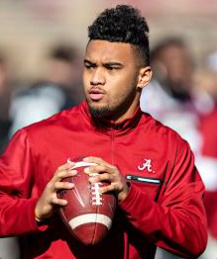The various sports may be very different, but that isn’t what counts. It is the way decisions about TBI histories are made that are relevant.
Medical science is showing that, over time, concussion damage accumulates. That people with a history of concussions can be affected for a lifetime. Thinking, moods, behavior, etc. People with TBI histories can lose their ability to make good decisions. A history of TBI’s can lead to destroyed lives.
There are several tragic NFL post-career examples of this. One could argue that there have been a few more stories among certain names that have been prominent in UL eventing.
The (NFL) Tua question is, imo, a good comparison question to many riders in horse sports generally that are also carrying around a history of multiple concussions.
Who should decide what their activity in the sport should be, and based on what criteria?
For those not up on the situation, Tua is the 26 yo QB of the Miami Dolphins, who has suffered multipe serious concussions during games between 2022 and 2024. There are reports of other concusions during his 3 year college career.
Tua has exhibited marked symptoms of TBI on the field, in front of cameras. Including staggering, a ‘fencing response’ (stiff arms), and unfocused eyes.
But he’s a tough player who continues to go back into games after a clearly impactful injury. He continues to be the starter. He has missed only a few games due to the NFL ‘concussion protocol’.
The Miami team organization, the head coach and the coaching staff seem to be leaving the decision to play up to Tua himself, and to the NFL concussion protocol rules. Tua is always on board to play.
The Tua situation is attracting increasingly heated controversy. Who should have the final decision if Tua should continue to play, should continue to pursue his NFL QB career? The league? The doctors? The coaches? Tua?
Fwiw, his parents have said that they have wanted him to retire from football since 2022 because of his accumulated TBI’s. Also, several head coaches of other teams have spoken publicly that Tua continuing to play is “extremely concerning”, in his own best interests. It is vanishingly rare for any head football coach to comment publicly on decisions being made by other teams. Tua’s TBI’s are the exception.
Anyway. I’m not sure that this will ever be a question for Liz, based on what very, very little we know now. But there are other riders out there – and have been in the past – who I think are/were a question mark of their own best interests.
And who should make those decisions, if TBI’s are damaging thought and decision processes.
(Tua is a one-name wonder because his full Samoan name is a lot for many commentators. Tuanigamanuolepola Tagovailoa. The pronunciation doesn’t strictly follow the spelling. So, in the U.S. he goes by Tua.)



